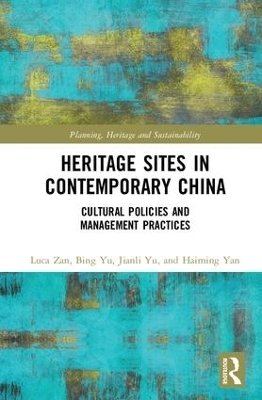
Heritage Sites in Contemporary China
Routledge (Verlag)
978-1-138-05462-2 (ISBN)
Heritage Sites in Contemporary China: Cultural Policies and Management Practices focuses on cultural heritage policies in China emerging in the period of the 11th and 12th Five Year Plans. Various important Chinese sites across China are investigated, including Luoyang Sui, Daming Gong, Niuheliang, Xinjiang, and Nanyuewang through the dual perspective of archaeological debate and as a case study of policy making. It explores the relationship between policy and the institutional and administrative conditions, such as budgeting and land concerns, which affect it. Building on the research project implemented by the China Academy for Cultural Heritage (CACH) from 2012–2014, which focused on the impact of the Dayizhi Policy for Great Archaeological Sites, the book provides an interdisciplinary insider’s approach to viewing archaeological discoveries; policies and emerging practices in site and archaeological management; and public administration in China. Featuring contributions from experts within CACH and from the Chinese community of archaeologists, and including numerous tables, data and maps, it will appeal to researchers and scholars in disciplines such as archaeology, heritage management, public administration, and policy making.
Luca Zan is Professor of Arts Management at the University of Bologna, Italy; Adjunct Faculty at Carnegie Mellon University, USA; and Central Academy of Fine Arts, Beijing. His current research focuses on international comparisons in managing arts and heritage organizations. Bing Yu holds Masters degrees in Engineering and Business Administration. She is currently a Research Fellow and Deputy of the Institute for Heritage Studies, CACH, Beijing. Jianli Yu holds Masters degrees in Archaeology and Science. He is an Associate Research Fellow at the Institute for Heritage Studies, CACH, Beijing. Haiming Yan holds a PhD in Sociology and is currently an Associate Research Fellow at the China World Cultural Heritage Center, CACH, Beijing.
Introduction 1. Contextualizing heritage discourse in current China 2. Early conversations and profressional practices regarding large-scale cultural relics 3. Setting the dayizhi policy 4. A three-level discussion on the dayizhi policy: toward unanticipated consequences? 5. Desk and field work: the research methodology 6. Luoyang and the Sui and Tang Capital City: complex heritage inside a crucial district 7. Xi’an and Daming Palace 8. Niuheliang: from dayizhi to parkization in a rural area 9. Xinjiang: the tensions between heritage, landscape conservation, and social impacts in a harsh climate 10. Nanyuewang Palace site 11. Yanxiadu Capital site 12. Understanding dayizhi practices from the field work 13. Assessing the dayizhi policy: the aggregate view 14. Dayizhi policy: addressing some unanticipated driving forces Concluding Remarks - beyond dayizhi
| Erscheinungsdatum | 17.04.2018 |
|---|---|
| Reihe/Serie | Planning, Heritage and Sustainability |
| Zusatzinfo | 67 Tables, black and white; 23 Line drawings, black and white; 6 Halftones, black and white; 29 Illustrations, black and white |
| Verlagsort | London |
| Sprache | englisch |
| Maße | 156 x 234 mm |
| Gewicht | 612 g |
| Themenwelt | Kunst / Musik / Theater |
| Reisen ► Reiseführer | |
| Geisteswissenschaften ► Archäologie | |
| Naturwissenschaften ► Biologie ► Ökologie / Naturschutz | |
| Naturwissenschaften ► Geowissenschaften ► Geografie / Kartografie | |
| Sozialwissenschaften ► Soziologie | |
| Technik ► Architektur | |
| ISBN-10 | 1-138-05462-3 / 1138054623 |
| ISBN-13 | 978-1-138-05462-2 / 9781138054622 |
| Zustand | Neuware |
| Haben Sie eine Frage zum Produkt? |
aus dem Bereich


